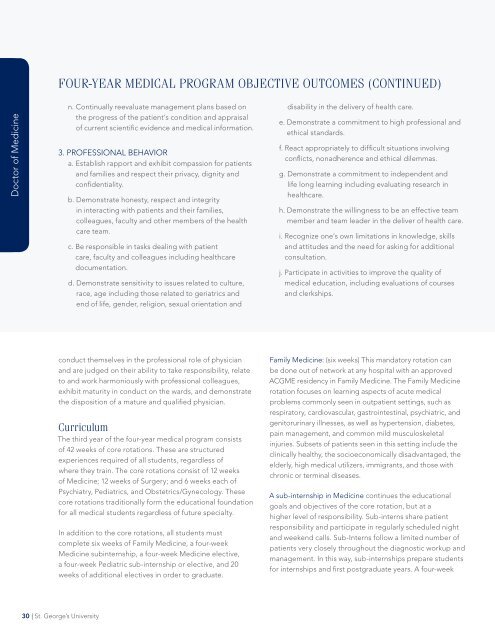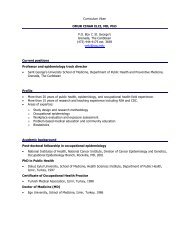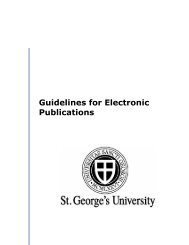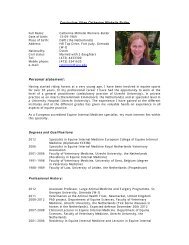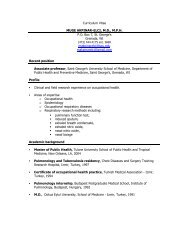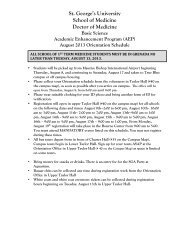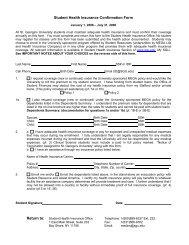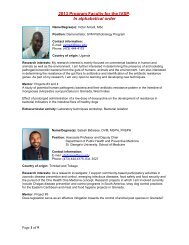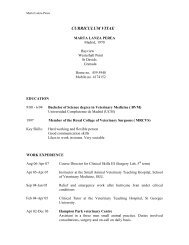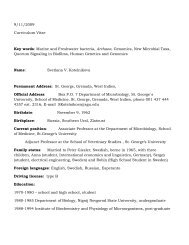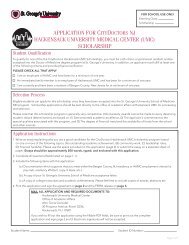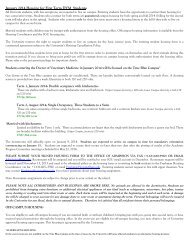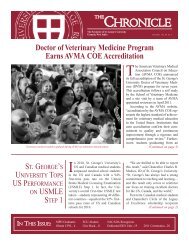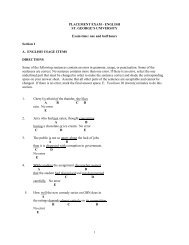SCHOOL OF 2012-2013 - St. George's University
SCHOOL OF 2012-2013 - St. George's University
SCHOOL OF 2012-2013 - St. George's University
You also want an ePaper? Increase the reach of your titles
YUMPU automatically turns print PDFs into web optimized ePapers that Google loves.
Four-Year Medical Program Objective Outcomes (continued)<br />
School of Medicine<br />
Doctor of Medicine<br />
n. Continually reevaluate management plans based on<br />
the progress of the patient’s condition and appraisal<br />
of current scientific evidence and medical information.<br />
3. Professional Behavior<br />
a. Establish rapport and exhibit compassion for patients<br />
and families and respect their privacy, dignity and<br />
confidentiality.<br />
b. Demonstrate honesty, respect and integrity<br />
in interacting with patients and their families,<br />
colleagues, faculty and other members of the health<br />
care team.<br />
c. Be responsible in tasks dealing with patient<br />
care, faculty and colleagues including healthcare<br />
documentation.<br />
d. Demonstrate sensitivity to issues related to culture,<br />
race, age including those related to geriatrics and<br />
end of life, gender, religion, sexual orientation and<br />
disability in the delivery of health care.<br />
e. Demonstrate a commitment to high professional and<br />
ethical standards.<br />
f. React appropriately to difficult situations involving<br />
conflicts, nonadherence and ethical dilemmas.<br />
g. Demonstrate a commitment to independent and<br />
life long learning including evaluating research in<br />
healthcare.<br />
h. Demonstrate the willingness to be an effective team<br />
member and team leader in the deliver of health care.<br />
i. Recognize one’s own limitations in knowledge, skills<br />
and attitudes and the need for asking for additional<br />
consultation.<br />
j. Participate in activities to improve the quality of<br />
medical education, including evaluations of courses<br />
and clerkships.<br />
conduct themselves in the professional role of physician<br />
and are judged on their ability to take responsibility, relate<br />
to and work harmoniously with professional colleagues,<br />
exhibit maturity in conduct on the wards, and demonstrate<br />
the disposition of a mature and qualified physician.<br />
Curriculum<br />
The third year of the four-year medical program consists<br />
of 42 weeks of core rotations. These are structured<br />
experiences required of all students, regardless of<br />
where they train. The core rotations consist of 12 weeks<br />
of Medicine; 12 weeks of Surgery; and 6 weeks each of<br />
Psychiatry, Pediatrics, and Obstetrics/Gynecology. These<br />
core rotations traditionally form the educational foundation<br />
for all medical students regardless of future specialty.<br />
In addition to the core rotations, all students must<br />
complete six weeks of Family Medicine, a four-week<br />
Medicine subinternship, a four-week Medicine elective,<br />
a four-week Pediatric sub-internship or elective, and 20<br />
weeks of additional electives in order to graduate.<br />
Family Medicine: (six weeks) This mandatory rotation can<br />
be done out of network at any hospital with an approved<br />
ACGME residency in Family Medicine. The Family Medicine<br />
rotation focuses on learning aspects of acute medical<br />
problems commonly seen in outpatient settings, such as<br />
respiratory, cardiovascular, gastrointestinal, psychiatric, and<br />
genitorurinary illnesses, as well as hypertension, diabetes,<br />
pain management, and common mild musculoskeletal<br />
injuries. Subsets of patients seen in this setting include the<br />
clinically healthy, the socioeconomically disadvantaged, the<br />
elderly, high medical utilizers, immigrants, and those with<br />
chronic or terminal diseases.<br />
A sub-internship in Medicine continues the educational<br />
goals and objectives of the core rotation, but at a<br />
higher level of responsibility. Sub-interns share patient<br />
responsibility and participate in regularly scheduled night<br />
and weekend calls. Sub-Interns follow a limited number of<br />
patients very closely throughout the diagnostic workup and<br />
management. In this way, sub-internships prepare students<br />
for internships and first postgraduate years. A four-week<br />
30 | <strong>St</strong>. George’s <strong>University</strong>


